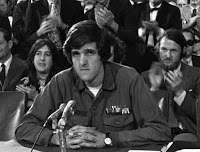 |
| The Imperial Obama? Image from The Express Tribune. |
The ‘new normal’?
The Imperial Presidency
“Same as it ever was…”
— Talking Heads (“Once in a Lifetime”)
By Jim Turpin | The Rag Blog | February 27, 2013
First of a two-part series.
Many presidents throughout our history, from revered to despised, have ignored the Constitution and taken on the mantle of imperial power. From Lincoln to FDR to Nixon, the examples are easily found.
In the ancient Roman world, the term imperium refers to the amount of power given to individuals of authority such as dictators or consuls and was frequently applied to generals with military power. The term “imperial” usually is linked to an empire or the concept of imperialism.
But how have we gotten to where we are today, where the president of the United States can detain or assassinate an American citizen without due process? Where American citizens are constantly monitored and personal information is subject to review? Where whistleblowers are now detained and prosecuted for exposing war crimes and corruption?
The development of the executive branch’s imperial power has its gnarled roots deep in American history. Frequently presidents have used it as an excuse during times of war, but this has not always been the case.
Abraham Lincoln famously suspended habeas corpus during the Civil War on April 27, 1861, in response to riots, local militia actions, and the threat that the border slave state of Maryland would secede from the Union. Habeas corpus (literally in Latin “you shall have the body [in court]”) is specifically detailed in the U.S. Constitution in Article I, Section 9: “The Privilege of the Writ of Habeas Corpus shall not be suspended, unless when in Cases of Rebellion or Invasion the public Safety may require it.”
A writ of habeas corpus is used to bring a prisoner or other detainee before the court to determine if the person’s imprisonment or detention is lawful.
Franklin D. Roosevelt issued Executive Order 9066 over 70 years ago on February 19, 1942, which led to the forced internment of more than 120,000 Japanese-Americans that lived on the west coast.
The U.S., citing national security interests, demanded that Japanese-Americans be interned without due process or, it would eventually turn out, any factual basis. Whole communities were rounded up and sent to camps, sometimes just clapboard shelters or converted horse stables, in arid deserts and barren fields in Utah, Idaho, Wyoming, Arkansas.
 |
| Nixon’s paranoid presidency.. |
Richard M. Nixon’s deep paranoia over the civil rights and peace movement led to the continued use of the secret FBI program Counterintelligence Program (COINTELPRO), as a means to monitor, sabotage, and neutralize legitimate dissent across the country. COINTELPRO infiltrated the Southern Christian Leadership Conference (SCLC), the NAACP, the Students for a Democratic Society (SDS), the National Lawyer Guild, and many other groups and organizations.
But what drives today’s constitutional overreach by the Executive Office? Recent history points to a number of factors, including:
- Codification of the Executive’s Imperial Power
- America’s One Party System
Codification of the Executive Imperial Power
Within days of the 9/11 attacks, the U.S. Congress responded by ramroding a number of open-ended laws that gave the Executive branch a blank check to wage war world-wide and indefinitely detain civilians at home and abroad.
Joanne Mariner of Justia.com neatly fits together the convoluted pieces of the Patriot Act, the Authorization of the Use of Military Force (AUMF), and the National Defense Authorization Act (NDAA) which, though initiated by George W. Bush, is now fully promulgated by Barack Obama:
During the Bush years, despite massive public and press attention to the administration’s detention policies, Congress remained largely out of the picture. While the USA PATRIOT Act contained some provisions on detention, they were never put to use; the Bush administration preferred to create a detention system that was, it assumed, largely free of legal constraints and judicial oversight.
The military prison at Guantanamo and the CIA’s secret prison system were therefore created by executive fiat, without congressional input or restriction. When cases challenging Guantanamo and the military detention of U.S. citizens on U.S. soil got to court, however, the administration claimed that the Authorization for Use of Military Force (AUMF), a joint resolution passed by Congress in September 2001, gave congressional approval for those detentions.
The AUMF, which authorizes the president to use “necessary and appropriate force” against those whom he determined “planned, authorized, committed or aided” the September 11 attacks, or who harbored such persons or groups, is silent on the issue of detention. A plurality of the U.S. Supreme Court agreed with the administration, nonetheless, that the power to detain is necessarily implied by the power to use military force.
The NDAA, which is renewed every year, also contains sections, according to Mariner, that are deeply troubling to human rights activists:
What is now known as Subtitle D of the NDAA — the section on detention — made its first appearance in March of this year (2011). Called the Detainee Security Act in the House, and the Military Detainee Procedures Improvement Act in the Senate, the bills, introduced by Representative Buck McKeon and Senator John McCain, respectively, were meant to shift counterterrorism responsibilities from law enforcement to the military.
The clear goal of the two bills was to require that suspected terrorists either be tried before military commissions or be held in indefinite detention without charge… every provision in subtitle D is objectionable from the standpoint of human rights and civil liberties. Among the controversial provisions are sections 1026, 1027 and 1028 of the bill, which restrict detainee transfers and releases from Guantanamo. But while human rights organizations are worried about these limitations, their gravest concerns pertain to sections 1021 and 1022.
Glenn Greenwald, while still at Salon, addresses Sections 1021 and 1022:
There are two separate indefinite military detention provisions in this bill. The first, Section 1021, authorizes indefinite detention for the broad definition of “covered persons” discussed above in the prior point. And that section does provide that “Nothing in this section shall be construed to affect existing law or authorities relating to the detention of United States citizens, lawful resident aliens of the United States, or any other persons who are captured or arrested in the United States.” So that section contains a disclaimer regarding an intention to expand detention powers for U.S. citizens, but does so only for the powers vested by that specific section.
More important, the exclusion appears to extend only to U.S. citizens “captured or arrested in the United States” — meaning that the powers of indefinite detention vested by that section apply to U.S. citizens captured anywhere abroad (there is some grammatical vagueness on this point, but at the very least, there is a viable argument that the detention power in this section applies to U.S. citizens captured abroad).
But the next section, Section 1022, is a different story. That section specifically deals with a smaller category of people than the broad group covered by 1021: namely, anyone whom the President determines is “a member of, or part of, al-Qaeda or an associated force” and “participated in the course of planning or carrying out an attack or attempted attack against the United States or its coalition partners.”
For those persons, section (a) not only authorizes, but requires (absent a Presidential waiver), that they be held “in military custody pending disposition under the law of war.” The section title is “Military Custody for Foreign Al Qaeda Terrorists,” but the definition of who it covers does not exclude U.S. citizens or include any requirement of foreignness.
That section — 1022 — does not contain the broad disclaimer regarding U.S. citizens that 1021 contains. Instead, it simply says that the requirement of military detention does not apply to U.S. citizens, but it does not exclude U.S. citizens from the authority, the option, to hold them in military custody.
The annual renewal of the NDAA by the Congress of the United States is a sad and deeply troubling testimony to how we empower an Executive branch that is ironically supposed to have their overreach limited by the very branch voting for this law.
America’s One Party System
 |
| John Kerry, Winter Soldier. |
During the presidential election last fall, if I closed my eyes and listened to speeches on national security, there was basically no policy difference. Both parties called us the “Greatest nation on Earth” and tried to outdo the other with patriotic and nationalistic proclamations and slogans.
As pointed out by Mother Jones during coverage of the election for both party’s conventions, John Kerry (who coincidentally became our new Secretary of State in 2013) spouted, “Ask Osama bin Laden if he is better off now than he was four years ago.”
The story went on:
…Democrats have adopted the kind of language that might have been derided as “cowboy rhetoric” four years ago. And Kerry wasn’t the first or last speaker to invoke Bin Laden in Charlotte last week [in 2012]. Asking for four more years of Obama, Vice President Joe Biden intoned that “Osama bin Laden is dead and General Motors is alive!” Eight years ago, Democrats trying to act tough on national security sounded like kids playing pretend; at times, this year’s convention sounded like a Roman triumph.
Let’s remember, this is the same Lieutenant John Kerry who as a member of Vietnam Veteran’s Against the War (VVAW) spoke at Winter Soldier in 1971 in Washington, D.C., decrying militarism and war:
We are here in Washington also to say that the problem of this war is not just a question of war and diplomacy. It is part and parcel of everything that we are trying as human beings to communicate to people in this country, the question of racism, which is rampant in the military, and so many other questions also, the use of weapons, the hypocrisy in our taking umbrage in the Geneva Conventions and using that as justification for a continuation of this war, when we are more guilty than any other body of violations of those Geneva Conventions, in the use of free fire zones, harassment interdiction fire, search and destroy missions, the bombings, the torture of prisoners, the killing of prisoners, accepted policy by many units in South Vietnam. That is what we are trying to say. It is part and parcel of everything.
I would be curious to know if Kerry as the new Secretary of State remembers the importance of his testimony in 1971 and what his brothers at VVAW think of him now.
The same Mother Jones article deftly points out that:
Barack Obama has a plan to withdraw troops from Afghanistan, but neither candidate [Democratic or Republican] actually has a plan to end the war that started on September 11, 2001. Both parties accept that conflict as a permanent feature of American life. An American citizen in the U.S. is as likely to be killed by their own furniture as a Muslim terrorist, but fear of violent Islamic extremism has changed this country almost irrevocably.
But let’s compare… are the Democratic and Republican Party really just the same party on issues like national security?
ProPublica recently did a side-by-side comparison of Bush and Obama policies on the use of torture, surveillance, and detention and the results are not very surprising.
To Obama’s credit, CIA “black sites” (outsourced torture sites to foreign countries) and “enhanced interrogation techniques” (also known in the vernacular as “torture”) have been, as far as the American public is aware, discontinued and stopped by this administration.
But… Obama has continued the following policies started by Bush and ramped them up dramatically under his administration:
- Continued renewal of the Patriot Act;
- Wiretaps and data collection of U.S. citizens and foreign nationals;
- Continuation of Guantanamo prison as an indefinite detention center;
- Targeted killings (also known as “assassinations”) of U.S. citizens and foreign nationals without legal oversight;
- Significant increase of drone strikes in Afghanistan, Pakistan, Yemen, Somalia, and possibly now in Mali, that have killed thousands of civilians;
- The use of military commissions to nullify the rights of U.S. citizens and foreign nationals in civilian court.
On issues of national security, America really remains a one-party system that use the “War on Terror” as an excuse to abrogate civil liberties of its’ citizenry.
“You may ask yourself, where does that highway lead to?” — Talking Heads (“Once in a Lifetime”)
In the second installment of this article, I will investigate the use of assassination by “Star Chamber” and how a subjugated and cravenly media has led us down the highway of a fearful nation with fewer and fewer civil liberties.
[Rag Blog contributor Jim Turpin is an Austin activist and writer who works with CodePink Austin. He also volunteers for the GI coffeehouse Under the Hood Café at Ft. Hood in Killeen, Texas. Read more articles by Tim Turpin on The Rag Blog.]


















Thank you, Jim, for this excellent review of our current sorry state. I look forward to the second part.
Excellent and thoughtful post. Thank you.